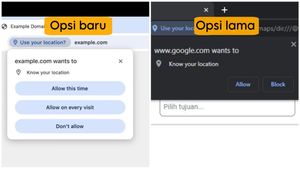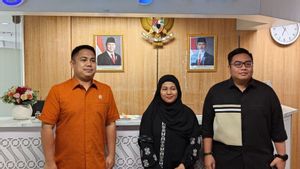JAKARTA - Worldcoin plans to develop its operations and register more users globally. They are also ambitious to allow other organizations to use their slice scanning technology and identity verification. This was revealed by a senior manager from the company behind the project to Reuters.
Assisted by Sam Altman, CEO of OpenAI, Worldcoin launched last week and offered users to provide scanning slices as exchanges for digital IDs and, in some countries, also accept free cryptocurrencies as part of their plans to create "identity and finance networks".
In various registration sites around the world, a number of people have had their facial scans using a glossy "orb" of light balls. However, concerns from privacy advocacy groups regarding potential misuse of biometric data still surfaced. Despite this, Worldcoin claims to have attracted 2.2 million users, mostly during the trial period over the past two years. Data protection authorities in the UK, France, and Germany have stated that they are investigating the project.
"We are on a mission to build the largest financial and identity community we can afford," said Ricardo Macieira, General Manager for Europe at Tools For Humanity, a company based in San Francisco and Berlin and is responsible for the Worldcoin project.
VOIR éGALEMENT:
Worldcoin has managed to raise $115 million from venture capital investors, including Blockchain Capital, a16z crypto, Bain Capital Crypto, and Distributed Global, in its funding round in May.
Macieira stated that Worldcoin will continue to expand in Europe, Latin America, Africa, and in all parts of the world who are willing to accept them.
The Worldcoin website mentions various potential applications, including distinguishing humans from artificial intelligence, enabling "global democratic processes," and showing a "potential path" towards universal base income, although the results are not guaranteed.
The majority of people interviewed by Reuters on various registration sites in the UK, India and Japan last week said they joined forces to get 25 free Worldcoin tokens that the company claims can be claimed by verified users.
Macieira says companies can pay Worldcoin to use their digital identity system. For example, if a coffee shop wants to give everyone a free cup of coffee, Worldcoin technology can be used to ensure that people don't claim more than one coffee without the coffee shop needs to collect personal data.
"The idea behind it is that we build this infrastructure and allow other third parties to use the technology," Macieira said.
According to Macieira, in the future, the technology behind the scanning orbit will be the open-source "Ide behind it is that anyone can build their own orbit in the future and use it for the benefit of the intended community," he said.
However, there are concerns about privacy. Privacy regulators and advocacy groups have raised concerns about Worldcoin data collection, including whether users give the right consent and whether a single company should be responsible for handling the data.
The Worldcoin website claims that the project is "independently private" and biometric data is deleted or users can choose to store it in encrypted form.
The Bavarian Data Protection Supervisory Office, which has jurisdictions in the European Union as the For Humanity Tools have offices there, said it had started an investigation into Worldcoin in November 2022 due to concerns about large amounts of sensitive data processing.
Michael Will, president of the Bavarian regulator, said he would examine whether the Worldcoin system was "safe and stable." This project requires very ambitious security measures and a lot of explanations and transparency to ensure data protection requirements are not ignored," he said.
Will stressed that people who provide their personal data need "absolute clarity" about how and why the data was processed.
A researcher on AI and the people at the Weizenbaum Institute in Berlin, Rainer Rehat, stated that the use of Worldcoin technology is "irresponsible" and it is unclear what problems the project will solve.
"The bottom line is a big project to create new consumer bases for Web3 and crypto products," he said. Web3 is a term for the next phase of hypothetical internet, based on blockchain technology, where user assets and data exist as tradable crypto assets.
In response to concerns about privacy, the Worldcoin Foundation, based in the Cayman Islands, stated in a statement that it complies with all laws governing personal data and will continue to cooperate with authorities to provide information about their privacy and data protection practices.
The English, Chinese, Japanese, Arabic, and French versions are automatically generated by the AI. So there may still be inaccuracies in translating, please always see Indonesian as our main language. (system supported by DigitalSiber.id)














